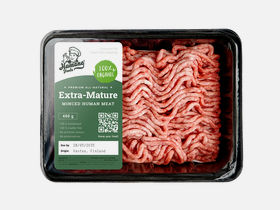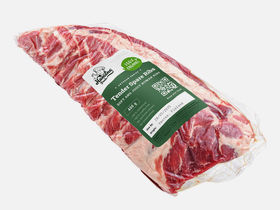
Find Your Kin is a speculative design work, that through the theme of anthropophagy, or cannibalism, aims to make us take a deep look into ourselves and our thinking as humans. In the project, the topic of cannibalism is examined and discussed from two different points of view.
The first one looks at human meat as a resource and solution for global problems of food waste, hunger and ethical issues of animal meat production. There is a very practical way of thinking behind: we grow large amounts of edible, organic matter in our bodies, but in the end all of it is just discarded, even though the flesh of deceased people could be used for feeding those who are still living. In some areas of the world, people try to deal with the very real problems of massive food waste, while the lack of nutrition defines the lives, and deaths, of others elsewhere. Meanwhile, the global meat industry makes birth to vast numbers of inhumanely treated animals with the sole purpose of becoming food for humans. In the project, a fictional company producing and distributing meat products, Humane Foods, represents this side of the story.
The second perspective sees cannibalism as a form of emotional bonding between people. The expression of people “being of the same flesh and blood” takes on a very literal interpretation in the project. The practice of affectionate endocannibalism is seen as method or ritual, that can bring like-minded strangers together, and help them form new communities, even families. Seeing our own bodies as something, that can help others find a sense of belonging, or as nutrition that keeps the cycle of life going after we are gone, could help us find more meaning in our lives – and deaths. An imaginary organisation called Kinfolk International has this as the basis for their operation. They provide services and products for people who are embarking on the meaningful journey of a communal, endocannibalistic lifestyle.
With both scenarios, the ethical issues of acquiring human meat – and the related problems of violence, crime and illegality – are solved by a system of voluntary donations and a legal consent from the person(s) to be eaten. At the core of both perspectives is questioning, what exactly is it in our collective moral understandings, that makes us feel so repulsed of the idea of eating human flesh, when we already consume the meat of almost anything else that lives and moves. Is it something learned, or is it somehow built into us on a biological level? On the other hand, in the natural world cannibalism is quite common. It is a natural part of mating rituals for some species, and a way of survival for many others. But for humans it is, and has been, one of the ultimate taboos.
Disclaimer: Please note, that the people appearing in the video, application mockup and pictures, have in real life nothing to do with the ideas presented in the project.
The profile information and names of people and companies are entirely fictional. The project makes use of royalty-free imagery and stock video footage, and the people appearing in those materials have no personal affiliation whatsoever with the author of this work, the project in it’s entirety or Aalto University. The creators of the used stock material have been credited at the end of the project presentation video.








